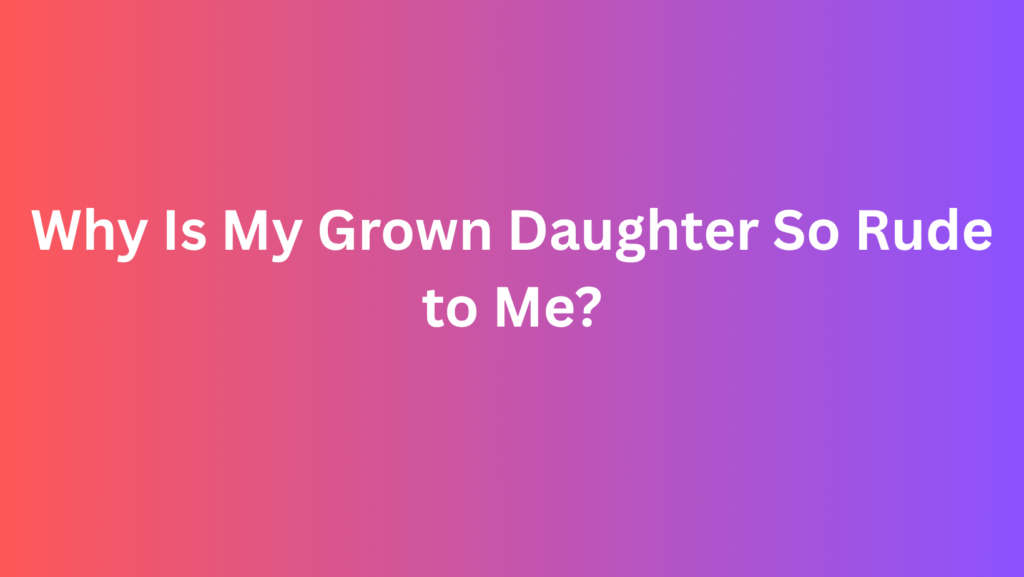Parenting doesn’t end when your children grow up—it simply changes. But what happens when your grown daughter becomes cold, disrespectful, or even openly rude to you?
You may find yourself asking with a heavy heart:
“Where did I go wrong?”
“Why is she treating me this way after everything I’ve done?”
“Did I fail as a mother?”
Before you drown in guilt or frustration, take a breath. You’re not alone—and you’re not powerless. Adult parent-child relationships can be complex and emotionally loaded. This blog post will help you understand why your grown daughter might be acting this way, and what you can do to create a healthier relationship.
💔 First, Acknowledge the Pain
It hurts deeply when someone you raised, loved, and sacrificed for seems to treat you with contempt. You may feel rejected, unappreciated, and heartbroken.
Let yourself feel that pain. But don’t let it become your identity. There’s still room for growth, understanding, and even reconciliation—if both sides are willing.
🧠 Possible Reasons Your Grown Daughter Is Rude to You
While every family is different, here are some common reasons daughters become distant or disrespectful in adulthood:
1. Unresolved Childhood Resentment
Your daughter may be holding onto feelings from the past that were never addressed—like:
- Feeling unheard or misunderstood as a child
- Emotional neglect (even if unintentional)
- Comparing her to siblings or being overly critical
- Harsh discipline or control
These old wounds may resurface as anger, even if the memories are hazy or distorted.
💬 Unhealed wounds can turn into bitterness—especially if there was never a chance to talk openly about them.
2. She Feels Criticized or Judged by You
Many adult daughters say they feel:
- Constantly corrected
- Judged for their parenting, lifestyle, or career choices
- Like they’ll “never be good enough” in their mother’s eyes
What feels like “help” or “advice” to you may feel like criticism to her. If she feels you don’t accept her for who she is now, she may lash out to protect herself.
3. She’s Struggling With Her Own Life and Taking It Out on You
If your daughter is overwhelmed—by marriage, motherhood, finances, or work—she may project that stress onto the safest emotional target: you.
While it’s not fair or kind, it’s common. Especially if you’ve always been her emotional safety net.
💡 Sometimes rudeness is a cry for help wrapped in anger.
4. There’s a Power Struggle
Some daughters struggle to transition from being “parented” to being treated like an equal adult. If you’re still trying to “fix” her life or control decisions, she may rebel in the only way she knows—through sharp words and cold behavior.
She may feel like she has to defend her independence—by pushing you away.
5. There’s Unspoken Hurt You Don’t Even Know About
Sometimes daughters carry pain you didn’t realize you caused. A comment made years ago. A moment you missed. A time she needed support and didn’t get it.
To you, it may seem small or long-forgotten. To her, it may still sting. If you haven’t created space for her to talk about those feelings, resentment can quietly grow into disrespect.
6. Generational Differences in Communication and Emotion
You may come from a time when emotions were more hidden and respect for parents was expected, no matter what. But your daughter may value emotional honesty—even if it comes out messy or rude.
She may not know how to express her frustration in a way that’s mature or kind.
👂 What Can You Do About It?
If you’re ready to work toward healing, here’s where to start:
✅ 1. Resist the Urge to Defend Yourself
It’s natural to want to explain or justify your side, especially if you feel attacked. But healing often begins with listening without defending. If she opens up, let her speak. Hear her feelings—without trying to correct her memory or prove your point.
💬 Say: “I’m listening. I may not remember things the same way, but I want to understand how you feel.”
✅ 2. Apologize—Even If You Meant Well
You may have done your best. But if something you said or did caused her pain, even unintentionally, a heartfelt apology can go a long way.
Example:
“I’m sorry if I ever made you feel unsupported or not good enough. That was never my intention, but I understand now how it hurt you.”
✅ 3. Set Boundaries for Respectful Communication
While her feelings are valid, disrespect is not. You have the right to say:
“I want to talk, but not when I’m being spoken to in a hurtful way.”
You can hold space for her pain without allowing abuse or ongoing rudeness.
✅ 4. Give Her Space (Without Withdrawing Love)
If things are tense, sometimes the best gift is space—paired with reassurance that your door and heart are always open.
Let her breathe, but leave the light on.
✅ 5. Lead With Love, Not Ego
You don’t have to be perfect to be a loving parent. And you don’t need to “win” every argument or prove your side. If your goal is connection, lead with compassion—even when it’s hard.
✅ 6. Seek Help if Needed
Family counseling or therapy—either individually or together—can help unpack years of miscommunication, hurt, and distance.
Sometimes an outside perspective is the bridge you need.
❤️ Final Thoughts
If your grown daughter is rude to you, it doesn’t mean she doesn’t love you. It often means there’s pain beneath the surface that hasn’t been named, understood, or healed.
And while you can’t force change, you can choose how you show up:
- With humility, not defensiveness
- With boundaries, not bitterness
- With love, even when it’s hard
Remember this: It’s not too late for healing. Many mother-daughter relationships go through seasons of distance—and still find their way back to closeness.
Start where you are. Speak from the heart. And know that your effort, your love, and your presence still matter.



